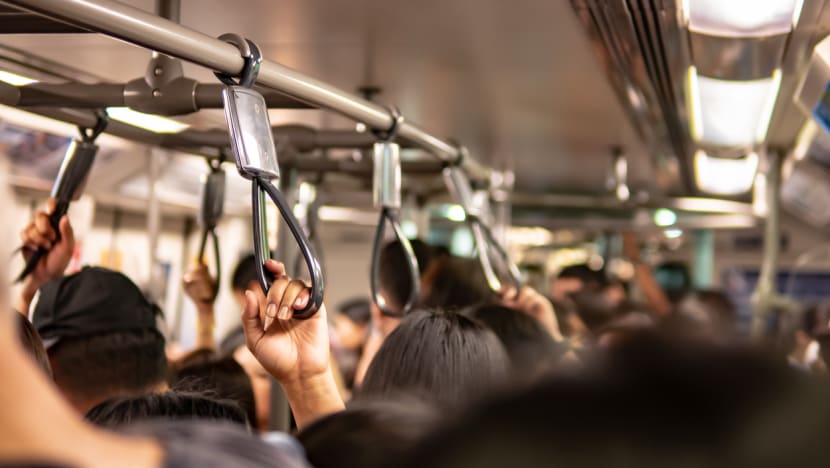Commentary: Why I'd rather brave rush-hour traffic than work from home forever
Everyone has multiple selves, and psychological role-switching is important for one to put on the right hat for the right situation. The daily work commute helps with that, says psychiatrist Lim Boon Leng.

File photo. People complain about the commute to work, but it can have psychological benefits. (Photo: iStock/Wachiwit)
SINGAPORE: As the morning sun slowly rose over the city, a familiar sight returned to the streets. Cars and buses lined up bumper to bumper on the roads, accidents blocking off certain lanes on the expressways. Commuters packed into trains and buses, jostling for a spot to stand or sit. The once-empty pavements and train platforms bustled with people hurrying to get to work.
For many of us, the daily commute used to be a dreaded chore that ate away at our precious hours. But then came the pandemic, and suddenly, commuting became a thing of the past for many workers around the world.
Even as employers and employees debate the pros and cons of four-day work weeks and flexible hours, or buzz words such as the Great Resignation, quiet quitting or career cushioning, some people have found themselves missing the familiar rhythms of the daily commute.
After more than three years, Singapore finally moved to DORSCON green on Feb 13, the lowest alert level since the pandemic started, signalling that life might return to its pre-pandemic norms.
If the rush-hour traffic is anything to go by, there is a certain normalcy to life again.
Most adults who previously worked from home would have returned to the office in one form or another, be it in a hybrid or full-time manner, and as such would have started commuting.
WORK FROM HOME – LIBERATING OR LONELY?
When the pandemic first hit us and the circuit breaker was implemented, the psychological reactions towards working from home were polarised.
On one hand, many appreciated not having to endure the stress of the rush hour. Patients told me they were delighted to be able to wake up naturally, have time to exercise and enjoy a leisurely breakfast before starting work.
Parents were able to spend more time with their children, and children who were caregivers were able to manage the needs of their elderly parents better.
Psychologically, these patients appreciated the added bandwidth resulting from the lack of commute and reported a decrease in their anxieties.
Individuals who had psychological difficulties taking public commutes due to anxiety disorders such as claustrophobia or panic disorder were able to cope better. Not having to worry about being trapped in an enclosed space in the train or the bus, some patients succeeded in taking on a job for the first time in their lives.
But not having to commute and working from home has also had its drawbacks, leaving some people feeling isolated and lonely. For employees with family, work can sometimes be the only legitimate reason they can give themselves (or their spouse) to leave home and get some alone time.
When the line between home and office became blurred, some found it difficult to have a proper routine or to get away from work. This resulted in them neglecting their meals, sleep, and even toilet breaks.
In a survey conducted by the American Psychiatric Association in 2021, the majority of respondents who worked from home said they found not going to the office problematic.
Nearly two-thirds of those surveyed said they feel isolated or lonely working from home at least sometimes, while 17 per cent said they felt that way all the time.
More than two-thirds of employees who worked from home at least part of the time reported they had trouble getting away from work at the end of the day always (22 per cent) or sometimes (45 per cent).
Younger adults (73 per cent of 18- to 29-year-olds and 73 per cent of 30- to 44-year-olds) were more likely to report feeling isolated or lonely working at home compared to older adults (48 per cent of 45- to 64-year-olds).
COMMUTING - A CHORE OR MUCH-NEEDED “ME TIME”?
Indeed, many patients I have seen in the past year have been relieved that they can return to the office despite having to endure the commute.
Most had seen commuting as a waste of time, but were now excited to see an end to being siloed at home and did not mind tolerating the commute.
They were eager to resume having social interactions with their colleagues in the office. These social interactions helped provide support, validation, and inspiration to their work.
They also found it easier to read the situation in the office and were less likely to be stressed or paranoid over second-guessing their superiors' opinions of them. The sense of security over their work improved as a result.
Some gave me feedback that they found the commuting in fact to be useful in that the commute served to anchor their routines by ritualistically marking the start and the end of the workday.
They missed having the commuting “me time” they had during the pandemic, be it listening to the radio while driving or streaming a video while on the train or bus.
Over the last two to three years, the resurgence of podcasts and an improvement in online content, as well as better mobile broadband data packages and speed have made commuting not only bearable but also a good time to catch up on their interests and entertainment.
These commutes allowed them a time to be truly free from both work and family, and they were able to detach their mind from the everyday worries of work and ordinary life.
Commuting can also allow one the chance to socialise with peers or colleagues who may be travelling in the same direction and to build deeper bonds with them.
Others told me that they allow themselves to steal some time off their tight schedules during their daily commutes to do something for themselves as “it’s along the way anyway”.
These are usually little guilty pleasures like shopping for an item or grabbing a cup of bubble tea or latte that they love. These stops help to perk them up psychologically before they return to their never-ending responsibilities.
PSYCHOLOGICAL ROLE-SWITCHING
Most importantly, commuting serves as a clear demarcation or boundary between work and life allowing for role switch between the two efficiently.
Everyone has multiple selves, and psychological role-switching is important for one to put on the right hat for the right situation.
The pandemic showed us that telecommuting and working from home is a viable option. Flexibility can exist and organisations can surely consider an individual’s social and psychological needs in deciding work arrangements.
Personally, I would rather brave the rush-hour traffic than experience the sad sight of a pandemic-stricken city with empty roads and empty trains again.
Dr Lim Boon Leng is a psychiatrist at the Gleneagles Medical Centre.























